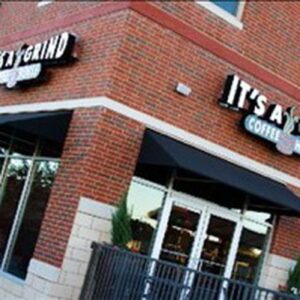
“The only one that’s ever felt this is you / The force that’s forcing you / To feel like busting up a Starbucks.”
I admit it: my family probably spends more money at Starbucks than at the grocery store. So, I was grateful to hear the news that our daily addiction might actually fund something useful in the world:
Starbucks and Opportunity Finance Network® (OFN) are working together to create and sustain jobs in underserved communities… The Starbucks Foundation is donating the first $5 million. And starting November 1, you can give, too, and we’ll direct 100% of your donation to OFN. When you give $5 it can help provide $35 worth of financing for community businesses. As a thank you for your donation, you’ll get a wristband to wear proudly as a symbol of your support.
The partnership is being called “Create Jobs for USA.”
This is pretty impressive — not just from a charitable impact basis, but from a marketing angle. After all, this economy has hit everyone’s Starbucks budget pretty hard. When you’re unemployed, it’s hard to justify $4+ for a cup of hot, dirty water.
(And with an angle like this… you can probably serve a lot more coffee to the swarming hordes of protestors in the Occupy movement who might have otherwise been against supporting a “chain coffee store.”)
So, kudos to Howard Schultz and his team for giving their company an innovative fit within the hottest P.R. issue facing our country — the persistent unemployment crisis.
And let’s be honest. This is not about charity. This is a marketing program: although they are taking shareholders’ dollars and giving them away to charity, they are doing so in a way that will generate an even greater return for their company.
In fact, it’s better than marketing. It’s tax-deductible P.R.
So far, they have a pretty good return building. Check out these sweet-as-a-caramel-latte articles that they received…. for free …. in response to their initial $5,000,000 investment:
Click here to show the list of articles >>
(And this doesn’t even include any of the articles about Starbucks launching a lighter “blond” line of coffee that also mentioned the “Create Jobs for US” program… and which may not have made it to press without this additional angle)
Nothing against basic human relief, but a $5 million donation to the nation’s largest network of food banks, Feeding America, never would have generated this kind of positive press.
And not just positive press, but positive press that has been read by millions of customers and potential customers. Positive press that is not about doing good, but being good. Big difference there.
Better yet, a number of the smaller blogs that I did not cite above even said something along the lines of: “Now, I am not a Starbucks fan, but this is pretty cool.”
You just can’t buy that kind of goodwill with $5 million of advertising, especially from key influencers among your brand’s detractors.
In fact, it’s not even that easy to do it with $5 million of philanthropy. For example, run a Google news search for articles on Chase Bank’s recent $5 million gift to microlender Accion Texas-Louisiana; you mostly get a bunch of local news sites and PR wires… not national headlines and swarms of editorials and blogs. Why didn’t this other gift create the firestorm of coverage that Starbucks has created with its campaign?

Starbucks will be selling these ‘Indivisible’ bracelets in nearly 7,000 cafes across the country.
Because Starbucks has adopted a brilliant approach to not only making a cash gift, but leveraging their nearly 7,000 storefronts in a way that will engage their millions of customers in supporting their campaign.
Even while this intentionally focuses the campaign within the context of a Starbucks, it manages to make the campaign stand for far more than just the company. Even their beneficiary — the Opportunity Finance Network — is not a single entity like Accion, but a network of the best microlenders in the country. Starbucks’ gift will be leveraged by these best-in-class organizations to maximize its impact across the country.
In fact, this leverage is the real brilliance of their donation … as pointed out by The New York Times… this money will be leveraged to the hilt, creating an even more exponential return for Starbucks:
“Here is the most beautiful part about the whole arrangement. The donations to Create Jobs for USA will not be loaned to the CDFIs (Community Development Financial Institutions). They will be turned into capital — equity that can be leveraged. Pinsky and others told me that that equity can be leveraged 7 to 1, meaning that if 10 million Starbucks customers donate $5, that will support $350 million worth of lending. That’s real money.”
And this article, like many others, ends with effusive praise for Starbucks:
“(Starbucks CEO Howard Schultz) is hoping that Starbucks customers will flock to it in droves. So am I.”
And honestly, so am I. We need this to work.
At the recent Microfinance USA conference in New York (one of the world’s largest annual gatherings of such organizations), the organizers launched the event with the profound statement that: “if 1 in 3 of our country’s small businesses created a single job, that would create enough jobs to eliminate unemployment.”
The combined microloan pool for every CDFI in the country stands at around $250 million. This one Starbucks campaign could more than double that.
So, this gift will do great things for the microfinance sector and for the small businesses that we support.
And yet, the point of this blog is that the “Create Jobs for US” campaign will also do great things for Starbucks itself. And it should.
If it does, it will cause more companies to look at how they can leverage their brands and customer relationships to make a positive impact on the larger world and on their bottom line.
That’s worth getting an upgrade to a Venti.
SLIGHTLY RELATED: Mike Doughty‘s “Busting Up a Starbucks” is worth getting.







